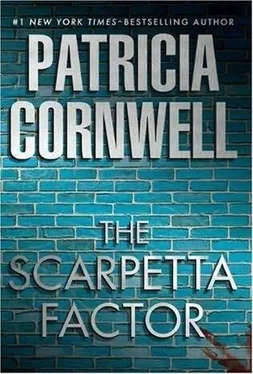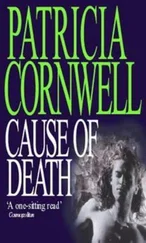“E-matches are very sensitive to current,” Lobo told Marino. “A few recorder batteries were all it took. But what someone would have had to do was alter the voice module’s slide switch and recorder circuit so the battery current set off the explosion as opposed to playing a recording.”
“The average person couldn’t do it?” Marino said.
“The average person could definitely do it, as long as he’s not stupid and follows directions.”
“On the Internet,” Marino thought out loud.
“Oh, yeah. You can practically build a fucking atom bomb,” Lobo said.
“If the Doc had opened it?” Marino started to ask.
“Hard to say,” Droiden said. “Could have injured her, that’s for sure. Maybe blown a few of her fingers off or gotten glass in her face and eyes. Disfigured her. Blinded her. For sure it would have gotten this nasty-smelling liquid all over her.”
“I assume that was the point,” Lobo said. “Someone wanted this liquid on her, whatever it is. And to mess her up pretty good. Let me take a look at the card.”
Marino unzipped his briefcase and gave Lobo the evidence pouch Scarpetta had given to him. Lobo pulled on a pair of gloves and started looking. He opened the Christmas card, an upset Santa on the glossy cover being chased by Mrs. Claus with a rolling pin. A woman’s thin, off-tune voice singing. “Have a Ho-Dee, Do-Dee Christmas…” Lobo peeled back stiff paper and slid out the voice module as the annoying tune continued, “Stick some mistletoe where it ought to go…” He disconnected the recorder from its batteries, three button batteries, AG10s no bigger than what goes inside a wristwatch. Silence, the wind gusting in from the water and through the fence. Marino couldn’t feel his ears anymore, and his mouth was like the Tin Man’s, in need of oil. It was getting hard to talk, he was so cold.
“A bare talking module ideal for greeting card mounting.” Lobo held the recorder close to Marino to show him. “The kind used by crafters and do-it-yourselfers. Full circuit with a speaker. Ready-made slider switch for auto play, which is the key to the whole thing. The sliding contact closes the firing circuit and triggers the bomb. Ready to order. Hell of a lot easier than making one yourself.”
Droiden was plucking bomb parts out of the wet, filthy mess in the pit. She got up and got closer to Marino and Lobo, holding silver, black, and dark-green plastic and metal fragments and black and copper wire in the palm of her nitrile-gloved hand. She took the intact recording module from Lobo and began making a comparison.
“Microscopic examination will confirm,” she said, but her meaning was plain.
“Same kind of recorder,” Marino said, cupping his big hands around hers to shield the frag from the wind and wishing he could stand there for a long time that close to her. Didn’t matter if he’d been up all night and was turning into a chunk of ice, he felt suddenly warm and alert. “Jesus, that stinks. And what is that, dog fur?” With a synthetic rubber-sheathed finger, he prodded several long, coarse hairs. “Why the hell is dog fur in it?”
“Looks like the doll was stuffed with fur. It might be dog fur,” she said. “I’m seeing significant similarities in the construction. The circuit board, the slider switch, the record button and microphone speaker.”
Lobo was studying the Santa card. He turned it over to see what was on the back.
“Made in China. Recyclable paper. An environmentally friendly Christmas bomb. How nice,” he said.
Scarpetta dragged the open suitcase across the floor. The twenty-nine accordion file folders inside it, bound by elastic bands and labeled with white stickers that had handwritten dates on them, covered a span of twenty-six years. Most of Warner Agee’s career.
“If I talked to Jaime, what do you think she’d tell me about you?” she continued to probe.
“That’s easy. I’m pathological.” Lucy’s anger flashed.
Sometimes her anger was so sudden and intense that Scarpetta could see it like lightning.
“I’m pissed all the time. Want to hurt someone,” Lucy said.
Agee must have moved a lot of his personal belongings to the Hotel Elysée, certainly ones that were important to him. Scarpetta picked out the most recent folders and sat on the carpet at her niece’s feet.
“Why do you want to hurt someone?” Scarpetta asked her.
“To get back what was fucking taken from me. To redeem myself somehow and get a second chance so I never let anybody do something like that to me again. Do you know what’s terrible?” Lucy’s eyes blazed. “It’s terrible to decide there are some people it’s okay to destroy, to kill. And to imagine it, to work it out in your mind, and not feel even a twitch or a twinge. To feel nothing. Like he probably felt.” Waving her arm as if Warner Agee was in the room. “That’s when the worst happens. When you feel nothing anymore. That’s when you do it-you do something you can’t take back. It’s terrible to know you’re really no different from the assholes you’re chasing and trying to protect people from.”
Scarpetta slipped off the elastic band of the accordion file that appeared to be the most recent one, beginning January first of this year, the end date left blank.
“You are different from them,” she said.
“I can’t take it back,” Lucy said.
“What is it you can’t take back?”
The file’s six compartments were crammed with papers, receipts, a checkbook, and a brown leather wallet that was worn smooth and curved from years of being carried in a back pocket.
“I can’t take back that I did it.” Lucy took a deep breath, refusing to cry. “I’m a bad person.”
“No, you’re not,” Scarpetta replied.
Agee’s driver’s license had expired three years ago. His Master-Card was expired. His Visa and American Express cards were expired.
“I am,” Lucy said. “You know what I’ve done.”
“You’re not a bad person, and I say that knowing what you’ve done. Maybe not everything, but plenty,” Scarpetta said. “You were FBI, ATF, and like Benton, involved in so much that you really couldn’t help and you certainly couldn’t talk about and likely still can’t. Of course I’m aware, and I’m also aware it’s been in the line of duty or for a very sound reason. Like a soldier on the front line. That’s what cops are, they’re soldiers who go beyond the limits of what’s normal so they can somehow keep life normal for the rest of us.”
She counted fourteen hundred and forty dollars cash, all twenties, as if they had come from an ATM.
Lucy then said, “Really? What about Rocco Caggiano?”
“What about his father, Pete Marino, if you hadn’t?” Scarpetta didn’t know the details of what had happened in Poland, and she didn’t want to, but she understood the reason. “Marino would be dead,” she said. “Rocco was involved in organized crime and would have killed him. It was already set in motion, and you stopped it.”
She began looking at receipts for food, toiletries, and transportation, a lot of them from hotels, stores, restaurants, and taxicabs in Detroit, Michigan. Paid in cash.
“I wish I hadn’t, that somebody else had. I killed his son. I’ve done a lot of things I can’t take back,” Lucy said.
“What can any of us take back? Foolish words, a phrase. People say it all the time, but in fact, we can’t take anything back,” Scarpetta said. “All we can do is step around the messes we’ve made and take responsibility and apologize and try to move on.”
She was making piles on the floor, digging in the accordion files to see what Agee had thought was important enough about his life to save. She found an envelope of canceled checks. Last January he spent more than six thousand dollars on two Siemens Motion 700 hearing aids and accessories. He’d donated his old ones to Goodwill and gotten a receipt. Soon after, he’d become a subscriber to a Web-based captioning telephone service. No pay stubs or bank records that might indicate where he was getting his money. She pulled out a manila envelope labeled IAP. It was thick with newsletters, conference programs, journal articles, all in French, and more receipts and plane tickets. In July 2006 Agee had traveled to Paris to attend a conference at the Institut Anomalous Psychologie.
Читать дальше












